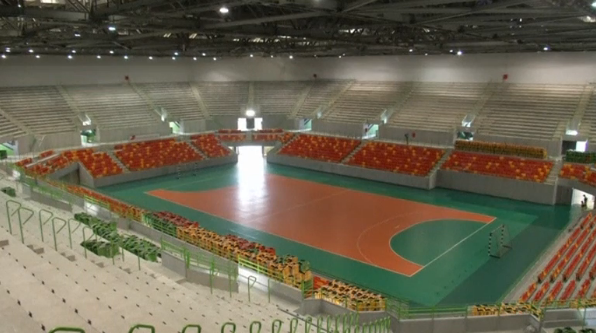
RIO DE JANEIRO, Brazil (Reuters) – Olympic authorities said on Monday (April 4) they were confident of progress in the Olympic Park in Rio’s Barra da Tijuca zone, where 15 competition venues will stage 23 sport disciplines in August.
The Future Arena in the Olympic Park was shown off as part of a guided tour of the facilities led by Olympic authorities keen to demonstrate the progress, four months before the start of the Games.
The 12,000-seater stadium will be used to host handball events during the Olympics which open on August 5, 2016 and goal ball during the Paralympics which will open a month later on September 7.
The arena is a “nomadic” structure and will be taken down following the games. The material will be used to build four public schools for different Rio de Janeiro neighborhoods.
The seats for the temporary arena have been rented and brought in ahead of a handball test event at the end of the month and a goal ball test event scheduled for May.
Leading the tour was Roberto Ainbinder, Director of the Municipal Olympic Company, an agency created by City Hall to coordinate works at the Olympic Park and Deodoro Sports Complex.
“Only three installations remain, the rest are ready – the Aquatic Center which will be finished in April, the Tennis Center which will be finished in May and the Velodrome at the end of May. We are completely up to date with our plans. 12 of the 15 installations have been handed over to the committee and now only three are left to be finished,” Ainbinder told reporters at the park.
The local organizing committee estimated at the start of the year that 97 percent of all installations were complete. What remains uncertain is whether transport infrastructure such as a planned metro line from the city center out to Barra will be ready on time.
“All the projects are in the final stages. Most sports venues have been handed over, the others will be finished in the coming months and then we move on to the operational stage in the city to make sure the city is working with events taking place throughout the four hubs and almost every day in the middle of the city. So, looking forward, we are focusing on city operations,” said Ainbinder.
Works are still going on in the Olympic Aquatics Stadium where swimming and water polo events will take place.
The 18,000-capacity stadium will be used as an Olympic Training Center after the Games.
Brazilian construction companies Odebrecht and Queiroz Galvao both responsible for Olympic construction projects have been caught in sweeping corruption probes centered around a major kick-back scheme at the state-run oil company, Petrobras. Olympic authorities deny this has lead to setbacks in infrastructure preparations.
Brazil’s Sports Minister George Hilton was pushed out of his job just five months before the Games – a sign of how the fallout from Brazil’s spiralling political crisis could affect the country’s preparations for South America’s first Olympics in August.
President Dilma Rousseff, who is trying to keep her coalition together as she battles impeachment proceedings, pushed out Hilton in a bid to woo back the PRB party, several party members said on condition of anonymity because they were not authorized to speak publicly about the matter.







